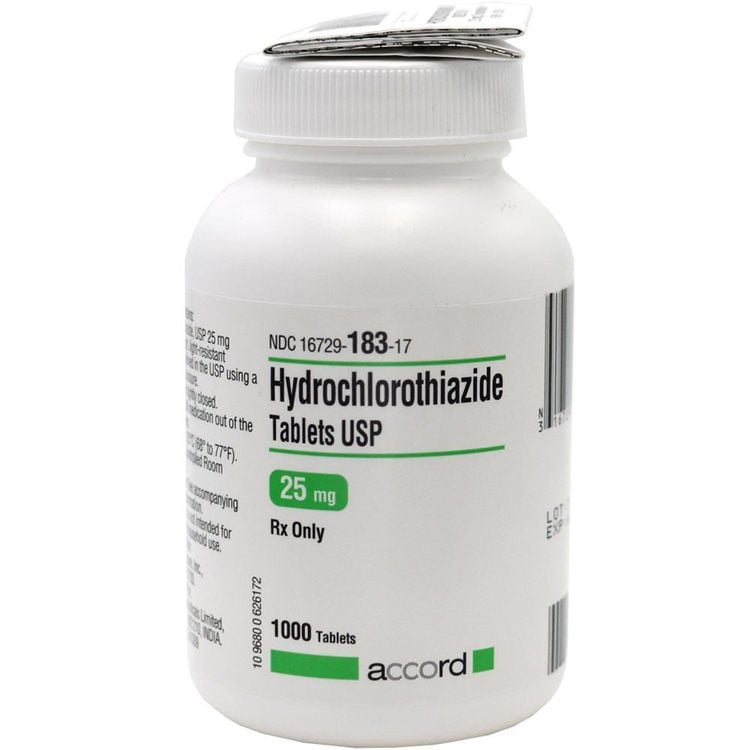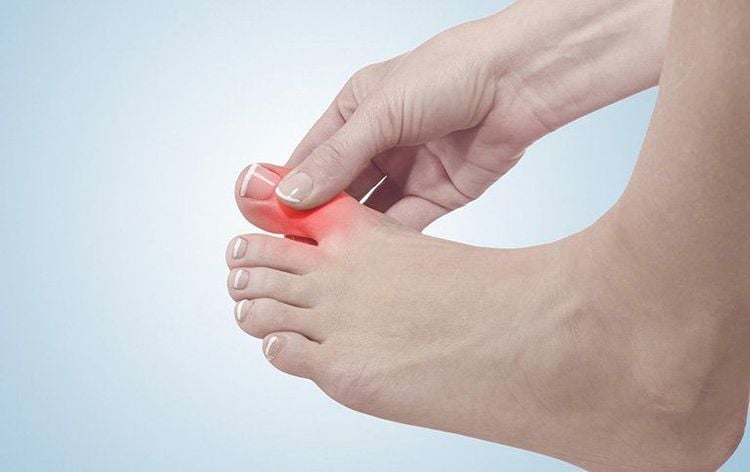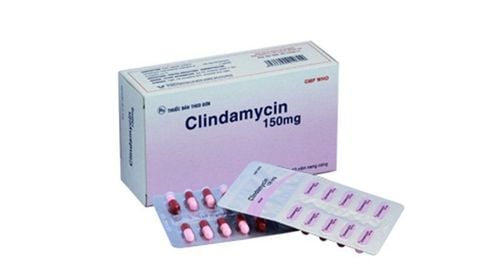This is an automatically translated article.
Hydrochlorothiazide is the most commonly prescribed thiazide diuretic indicated for the treatment of edema and hypertension. The use of hydrochlorothiazide was common but has since been gradually reduced, replacing ACE inhibitors or angiotensin II receptor blockers with stronger evidence of cardiovascular protection.1.Uses and indications of Hydrochlorothiazide
Hydrochlorothiazide is a drug belonging to the group of diuretics. It is used as monotherapy or in combination with other drugs to treat high blood pressure. Besides, one indication of the drug Hydrochlorothiazide is also used to reduce edema. This is water retention, which leaves an excess of fluid in body tissues due to various medical problems, including heart, kidney, and liver disease. Similarly, Hydrochlorothiazide also helps treat edema caused by the use of certain medications including estrogen and corticosteroids.
SEE ALSO: Drugs to treat high blood pressure, why take it for a long time?

Thuốc Hydrochlorothiazide sử dụng giúp giảm phù
2. Precautions when taking hydrochlorothiazide
In patients with renal disease, thiazides may precipitate uremia. Cumulative effects of the drug may develop in patients with impaired renal function. Thiazides should be used with caution in patients with impaired liver function or advanced liver disease, as minor changes in fluid and electrolyte balance can lead to hepatic coma.
Accordingly, thiazides may add to or enhance the action of other antihypertensive agents. Sensitization reactions may occur in patients with or without a history of allergies or bronchial asthma. The possibility of exacerbation or activation of systemic lupus erythematosus has been reported with hydrochlorothiazide.
Glaucoma: Hydrochlorothiazide, a sulfonamide, may induce a reaction of its own, leading to acute transient decreased visual acuity and acute angle-closure in glaucoma. Symptoms include acute onset of decreased vision or eye pain and usually occur within hours to weeks of initiating drug use. Untreated acute angle-closure glaucoma can lead to permanent vision loss. The main treatment is to stop hydrochlorothiazide as quickly as possible. Prompt medical or surgical treatment may need to be considered if intraocular pressure remains uncontrolled. Risk factors for developing acute angle-closure glaucoma may include a history of sulfonamide or penicillin allergy.

Bệnh nhân bị suy giảm chức năng gan cần thận trọng khi dùng thuốc hydrochlorothiazid
In general, all patients receiving diuretics in general, and hydrochlorothiazide in particular, should be evaluated for fluid and electrolyte balance. Determination of electrolytes in serum and urine is especially important when the patient experiences excessive vomiting. Warn for signs or symptoms of fluid and electrolyte imbalance, regardless of cause, including dry mouth, thirst, weakness, lethargy, drowsiness, restlessness, confusion, seizures, muscle pain or cramps, muscle fatigue, hypotension, oliguria, tachycardia and gastrointestinal disturbances such as nausea and vomiting.
Hypokalemia may develop, especially when rapidly increased with diuretics, with severe cirrhosis or after prolonged use of hydrochlorothiazide. Consequences can cause arrhythmias and can also sensitize or exaggerate the heart's response to the toxic effects of digitalis. Hypokalemia can be avoided or treated with potassium-sparing diuretics or potassium supplements such as foods high in potassium.
Hyponatremia may also occur in patients with edema or in hot weather when taking hydrochlorothiazide; Appropriate therapy is water restriction, rather than salt administration, except in rare cases when hyponatremia is life-threatening. At this point, hypertonic sodium infusion is indicated.
MORE: Should Hydrochlorothiazide or Furosemide or other drugs be used for patients with leg edema due to kidney failure, what dose?
Hyperuricemia may occur or acute gout may develop in some patients receiving thiazides. In diabetic patients, dose adjustment of insulin or oral hypoglycemic agents may be required when co-administered with hydrochlorothiazide because hyperglycemia may occur with thiazide diuretics. Therefore, latent diabetes mellitus may become manifest during thiazide therapy.
The antihypertensive effect of hydrochlorothiazide may be enhanced in patients after sympathectomy. If progressive renal failure becomes apparent, consider discontinuing hydrochlorothiazide. Furthermore, thiazides have been shown to increase urinary magnesium excretion; This can further lead to low blood pressure.

Một số bệnh nhân dùng thiazide có thể làm khởi phát bệnh gút cấp tính
Conversely, thiazides may decrease urinary calcium excretion and may cause intermittent elevation of serum calcium, causing disturbances in calcium metabolism. Marked hypercalcemia may be evidence of hidden hyperparathyroidism. Thiazides should be discontinued prior to performing parathyroid function tests. Increased cholesterol and triglyceride levels may be associated with diuretic therapy with the drug hydrochlorothiazide.
3. Adverse reactions of hydrochlorothiazide drugs
The adverse reactions of hydrochlorothiazide that have been reported by organ system are as follows:
Body as a whole: Sensation of muscle weakness Cardiovascular: Hypotension including standing. May be aggravated by alcohol, barbiturates, narcotics or other antihypertensives Gastrointestinal: Pancreatitis, jaundice (in cholestatic jaundice), diarrhea, vomiting, ethmoiditis, cramps , constipation, stomach irritation, nausea, loss of appetite. Hematology: Aplastic anemia, agranulocytosis, leukopenia, hemolytic anemia, thrombocytopenia. Hypersensitivity: Anaphylactic reactions, necrotizing vasculitis (vasculitis and skin vasculitis), respiratory failure including pneumonia and pulmonary edema, photosensitivity, fever, urticaria, rash, purpura. Metabolism: Disorders of electrolytes, tendency to increase blood sugar, appearance of sugar in the urine. Musculoskeletal: Muscle spasm. Neurological: Dizziness, paresthesia, headache, irritability Kidneys: Renal failure, renal dysfunction, interstitial nephritis Skin: Erythema multiforme including Stevens-Johnson syndrome, exfoliative dermatitis such as gangrene toxic epidermal cells, hair loss in patches. Urology: decreased male libido

Viêm tụy là một phản ứng bất lợi của thuốc hydrochlorothiazide có thể xảy ra
4.Drug interactions with hydrochlorothiazide drugs
When using concurrently the following drugs may interact with hydrochlorothiazide:
Alcohol, barbiturates or narcotics: Increases the possibility of orthostatic hypotension. Antidiabetic Drugs (Oral and Insulin): Adjustment of the dose of the antidiabetic may be necessary. Other antihypertensive agents: Enhanced antihypertensive effect Cholestyramine and Colestipol: Impaired absorption of hydrochlorothiazide Corticosteroids, ACTH: Increased likelihood of electrolyte disturbances, especially hypokalemia. Skeletal muscle relaxants: May increase responsiveness to muscle relaxants Lithium: Generally not recommended with diuretics. Diuretics reduce the renal clearance of lithium and add a high risk of lithium toxicity. Non-steroidal anti-inflammatory drugs: In some patients, use of this class of drugs may reduce the diuretic effect. In a nutshell, the drug Hydrochlorothiazide belongs to a class of drugs known as diuretics. By causing the kidneys to remove unnecessary water and salt from the body into the urine, hydrochlorothiazide is used to control blood pressure as well as reduce edema. However, during treatment, patients should be closely monitored for electrolyte status and promptly adjusted as well as other side effects.
Please dial HOTLINE for more information or register for an appointment HERE. Download MyVinmec app to make appointments faster and to manage your bookings easily.
References: webmd.com, accessdata.fda.gov












